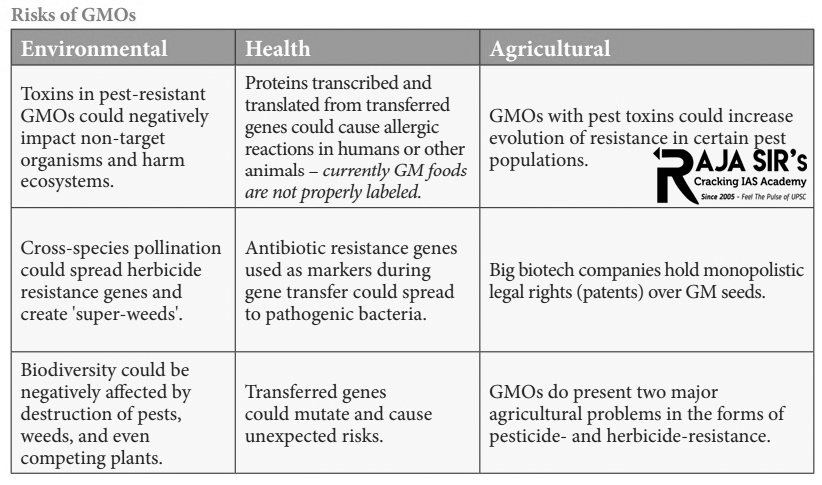- Home
- Prelims
- Mains
- Current Affairs
- Study Materials
- Test Series
Have GM crops caused damage to the environment?
- Now-a-days with therapid advance in research and development in Agricultural Biotechnology, countries are approving many genetically modified crops for commercial release and agricultural production.
- Though, it is widely claimed that Genetic modified organisms (GMO)offer dramatic promise for meeting some of the greatest challenges but it also poses certain risks, because it brings together new gene combinations which are not found in nature having possible harmful effects on health, environmental and non-target species.
- Therefore, Genetically Modified crops must be carefully scrutinisedbefore they can be put into production.
Genetic Modification
- “Genetic modification” involves altering the genes of an organism, be it a plant, animal or microorganism.
- GM technologyinvolves direct manipulation of DNA instead of using controlled pollination to alter the desired characteristics.
- It is one the approaches to crop improvement,all of which aim at adding desirable genes and removing undesirable ones to produce better varieties.
Current State of GM Crop Cultivation in India
- Indian farmers started cultivating Bt cotton,a pest-resistant, genetically modified version of cotton, in 2002-03.
- Bt modification is a type of genetic modification where the Bt gene obtained from the soil bacterium Bacillus thuringiensisis introduced into the target crop, in this case, cotton.
- Bt cotton is resistant to bollworm, a pest that destroys cotton plants.
- By 2014, around 96% of the area under cotton cultivation in India was Bt cotton, making India the fourth-largest cultivator of GM cropsby acreage and the second largest producer of cotton.
- Apart from cotton, there aremore than 20 crops under research and development in about 50 public and private sector organisations in India. Out of these, 13 crops have been approved for contained limited field trials in India.
- In October 2022, Genetic Engineering Appraisal Committee (GEAC)under the Union Ministry of Environment, Forest and Climate Change recommended the “environmental release” of the transgenic hybrid mustard DMH-11 for seed production.
Regulation of Genetic Modified Crops in India
- In India, strict regulations are in place to control threats to animal health, human safety, and biodiversity at large during the processes of development, cultivation and transboundary movement of GM crops.
- Acts and rules that regulate GM crops in India include:
- Environment Protection Act, 1986 (EPA)
- Biological Diversity Act, 2002
- Plant Quarantine Order, 2003
- Food Safety and Standards Act, 2006
- Drugs and Cosmetics Rule (8thAmendment), 1988
- Broadly, the rules cover:
- All activities related to research and development of GMOs
- Field and clinical trials of GMOs
- Deliberate or unintentional release of GMOs
Challenges Associated with GM Crops
- Ecological Concerns:Gene flow due to cross pollination can result in development of tolerant or resistant weeds that are difficult to eradicate.
- GM crops could lead to erosion of biodiversity and pollute gene poolsof endangered plant species.
- Genetic erosion has alreadyoccurred as the farmers have replaced the use of traditional varieties with monocultures.
- Loss of Nutritious Value:As genetic modification focuses more on increasing crops'' production, extending their lifespan, and deterring pests, some crops'' nutritional value has sometimes been compromised as well.
- It has been reported thatsome genetically modified foods drastically lacked nutritional value when compared with the original variety.
- Threat to Wildlife:Altering the genes of plants can also have serious effects on wildlife. For example, genetically modified plants, such as tobacco or rice, used to make plastic or pharmaceuticals, can pose a threat to mice or deer that eat crop debris after harvesting.
- Risk of Toxicity:Due to the nature of the product changes after genetic modification it becomes an alien for human metabolism.
- Sometimes,newer proteins in transgenic crops that are not consumed as food can become allergens and pose a risk of toxicity.
 Looking ahead
Looking ahead
- Curbing Illegal Cultivation of GM Seeds: In order to curb the illegal cultivation of GM seeds, the Genetic Engineering Appraisal Committee (GEAC)should:
- Collaborate with state governments andlaunch a nation-wide investigation drive.
- Take action onthreats of deliberate GM crop cultivation.
- Investigate andprosecute those involved in the illegal supply of GM Seeds.
- Encourage organic farming along with the GM crops.
- Indigenous Gene Banks:Native varieties should be preserved due to their ability to adapt to diseases and nutritional value. Gene banks can be established to assist various research institutions in conducting research and to help conserve indigenous varieties.
- Blending Modern and Traditional Technology:Supporting precise agriculture technologies with regulatory measures that preserve indigenous methods of farming is essential for agricultural sustainability in India.
- Promoting investment will motivate all technology developers to take interest in crops that are relevant to Indiaand using technologies for which there is a clear regulatory framework.
- Comprehensive Move Towards Sustainability:To create better food options and sustainable crop management, genetic modifications must be combined with improved farming credit, better use of water, and reduced waste.
- Environmental Impact Assessment (EIA):Compulsory Environmental Impact Assessment must be carried out by regulatory bodies in collaboration with independent environmentalists to assess the long-term impact of GM crops on ecology and health.









 Latest News
Latest News
 General Studies
General Studies